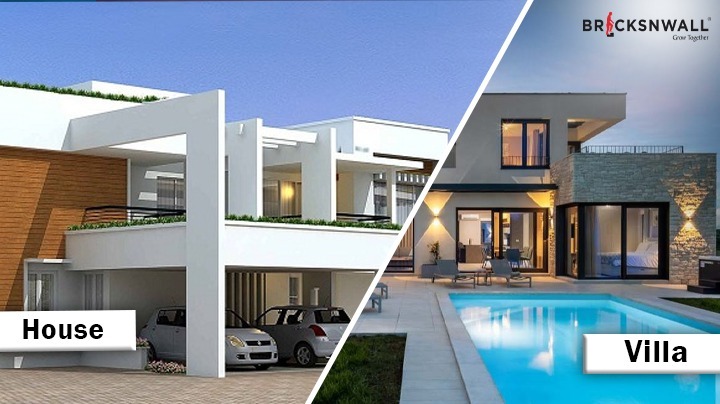Key Difference Between House & Villa
Koheli

Everyone dreams of owning a home one day. When the opportunity arises,
there will undoubtedly be a slew of questions. The first is, of course, the
location of your ideal home.
The second major problem is the type
of residence in which to invest. Both homes and villas have advantages and
disadvantages, but understanding the distinction between the two may provide a
lot of clarity. It will assist you in making better purchasing selections today
and prepare you for future real estate transactions.
A house is a structure that serves as
a place of residence and can range in complexity from straightforward homes
like the primitive huts of nomadic tribes to intricate, fixed buildings made of
wood, masonry, or other materials with plumbing, ventilation, and electrical
systems. A villa is a sizable, opulent residence frequently found in rural or
semi-rural areas. A wealthy family might use it as a second home during the
summer or on holidays, or they might live there year-round.
Difference between house and villa
"House" and
"villa" are words frequently used interchangeably when discussing
housing possibilities. But, fundamental distinctions between the two must be
understood before choosing which kind of property to rent or buy.
Size
The size of a house and a villa is one
of their primary distinctions. When comparing the size of the property as a
whole with the size of the individual rooms, estates are often larger than
homes. As compared to houses, villas frequently contain more rooms, and outdoor
space.
Style
Unlike residences, which sometimes
have simpler designs, villas typically have a more abundant and opulent
aesthetic. Villas may include more architectural elements, such as elaborate
mouldings, arches, and columns, whereas residences often have simpler designs.
Location
Villas may include facilities like a
private pool or access to the beach, and they are frequently found in more
premium and exclusive communities than houses. On the other hand, homes can be
found in a larger range of communities and may come with more fundamental
utilities.
Ownership
A single individual or family
frequently holds Villas. In contrast, homes are more often owned by a group of
individuals or a housing organization. This may affect the degree of control
over the property and the amount of upkeep offered.
Price
Villas frequently cost more than
houses because of their larger size and abundant features. A home might be more
sensible if you have a limited budget.
Amenities
Villas frequently feature additional
amenities than residences, including a tennis court, gym, or private pool. The
very existence of a villa shouts wealth. It is home to a select few who seek
privacy, comfort, and more while working under limited financial limitations.
Independent housing is about providing a pleasant living environment for you
and your family. It includes everything you need for a comfortable existence.
Design
Compared to houses, which frequently
have a more straightforward architecture, villas frequently have a more opulent
and elaborate aesthetic. Villas may include more architectural elements, such
as intricate mouldings, arches, and columns, whereas residences often have
simpler designs.
Conclusion
In aggregate, the key distinctions between a home and a villa are the size, style, location, ownership, and cost. It's crucial to consider these distinctions when deciding which kind of property is best for you, even if both offer distinctive advantages. In conclusion, both houses and villas provide a place to live. Still, mansions are frequently bigger, more opulent, and more expensive than houses. Your needs, interests and financial situation will ultimately determine whether you choose a house or a villa. Villas are sometimes found in premium communities with upmarket facilities and are frequently bigger, more expensive, and more abundant than houses. Homes, on the other hand, can be found in a larger range of communities and are typically more simplistic in form.




